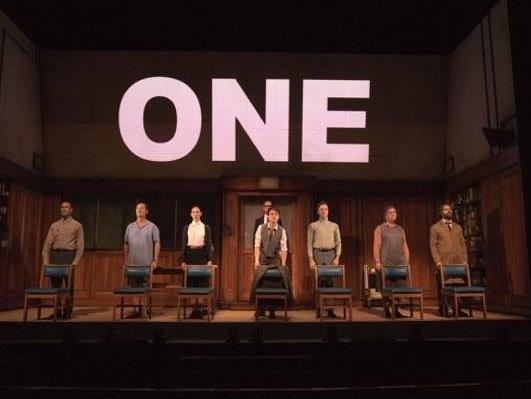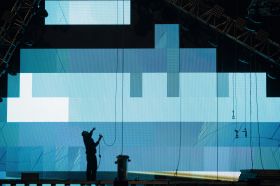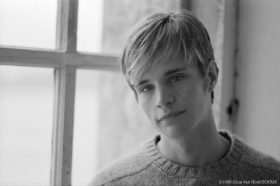Renato Musolino, Paul Blackwell, Ursula Mills, Tom Conroy, Guy O’Grady, Fiona Press, and Yalin Ozucelik in 1984. Photo by Shane Reid.
Playing true to George Orwell’s 1949 novel, directors Robert Icke and Duncan Macmillan present a theatrical treatment of the dawning of political awareness in Winston Smith with bright lights, grinding sound and carefully used lines from the original work. The novel’s contents are condensed to emphasise the themes that particularly resonate in contemporary society, with much of the political theory around socialism redacted and several original characters merged or omitted for clearer narrative flow.
Winston Smith starts keeping his covert diary, full of self-doubt and unsure even of the correct date, immersed in a vision of a future time when his handwritten artefact is a conversation starter for book readers. The juxtaposition of Smith’s present and his prescient vision of future readers is achieved through clever set design and sophisticated cast arrangement, so that with a slight change of posture and a change of lighting, the present disappears and slides through the future exchanges, and back again, in the blink of an eye. Winston observes this turn of events, wanting to hear what posterity will have to say about him, about his time.
Events in his native reality dominate Winston’s attention, as he discovers more about Big Brother, takes evasive action within his heavily surveilled existence and takes personal political action with fellow rebel, Julia. The sinister motif of “Oranges and Lemons”, his fascination with the potential power of the “proles” (although that word is never used), the looming dread promise of Room 101, “Victory” Gin, doublespeak and the indoctrination of small children all make their appearance, driving the narrative to its grim conclusion where truth is whatever Big Brother decrees, even if 2 and 2 make 5 as a result.
Tom Conroy as Winston captures the impassioned naivete of the role, declaiming and striving to make sense of the world around him in the pursuit of truth. While he perseveres through the length and wordiness of some of the longer soliloquys, Conroy’s interactions with Ursula Mills (Julia) are awkward and desperate, demonstrating the constraints of a world where an Anti-Sex League holds influence. Terence Crawford as O’Brien brings an avuncular menace, perfectly balancing a wounded persuasion on behalf of Big Brother’s love for Winston and the stick of Room 101 in the face of Winston’s defiance. Paul Blackwell’s Parsons is a curious mixture of proud parent and baffled criminal, the conflicting emotions battling each other in his attempt to make sense of the world around him. Fiona Press brings a distinct stage presence in each of her many small roles, balancing strongly masculine threat and paranoia with maternal and comforting bustle whether working in a cafeteria, mothering an indoctrinated child, hanging out washing or participating in a future book club.
Impressive design from Chloe Lamford creates a versatile set that allows quick shifts in perception to do the heavy lifting between scenes, maintaining a mid-20th Century feel yet lifting events out of a strict historical period. The rapid changes in mood and location are assisted by Natasha Chivers’ lighting design, with Tom Gibbons’ sound design emphasising the jarring disconnection between Winston’s hopes and dreams and the demands of his autocratic society. Video designer Tim Reid uses cleverly placed screens to enhance a sense of surveillance in the trysts between Winston and Julia, sharing Big Brother’s perspective of the ubiquitous hyper-monitoring of citizens in this all-too-familiar world, but avoiding the tabloid voyeurism of the reality television franchise.
Icke and MacMillan present Winston’s tale within its distinct reality, while emphasising themes relevant and familiar to politically engaged contemporary audiences. Touring extensively, 1984 is presented in a classical theatrical production, featuring competent actors, interesting technical effects and carefully selected text in a clever translation of book to stage.
3 ½ stars out of 5
1984
By George Orwell
Adaptation by Robert Icke and Duncan MacMillan
Presented by Ambassador Theatre Group, GWB Entertainment & STCSA Present the Headlong, Nottingham Playhouse & Almeida Theatre production in association with QPAC, Sydney Theatre Company, Canberra Theatre Centre & Perth Theatre Trust
Directors: Robert Icke & Duncan MacMillan
Associate Director (Australia): Corey McMahon
Designer: Chloe Lamford
Lighting Designer: Natasha Chivers
Sound Designer: Tom Gibbons
Video Designer: Tim Reid
Associate Lighting Designer: Marc Gough
Associate Sound Designer: Richard Bell
Associate Video Designer: Ian Valkeith
Presented by permission of Bill Hamilton as the Literary Executor of the Estate of the Late Sonia Brownell Orwell
Performed by Paul Blackwell, Tom Conroy, Terence Crawford, Ursula Mills, Renato Musolino, Guy O’Grady, Yalin Ozucelik, Fiona Press, Poppy Bell (alternate nights) and Ava Gillies (alternate nights)
His Majesty’s Theatre, Perth
4 – 13 August 2017





